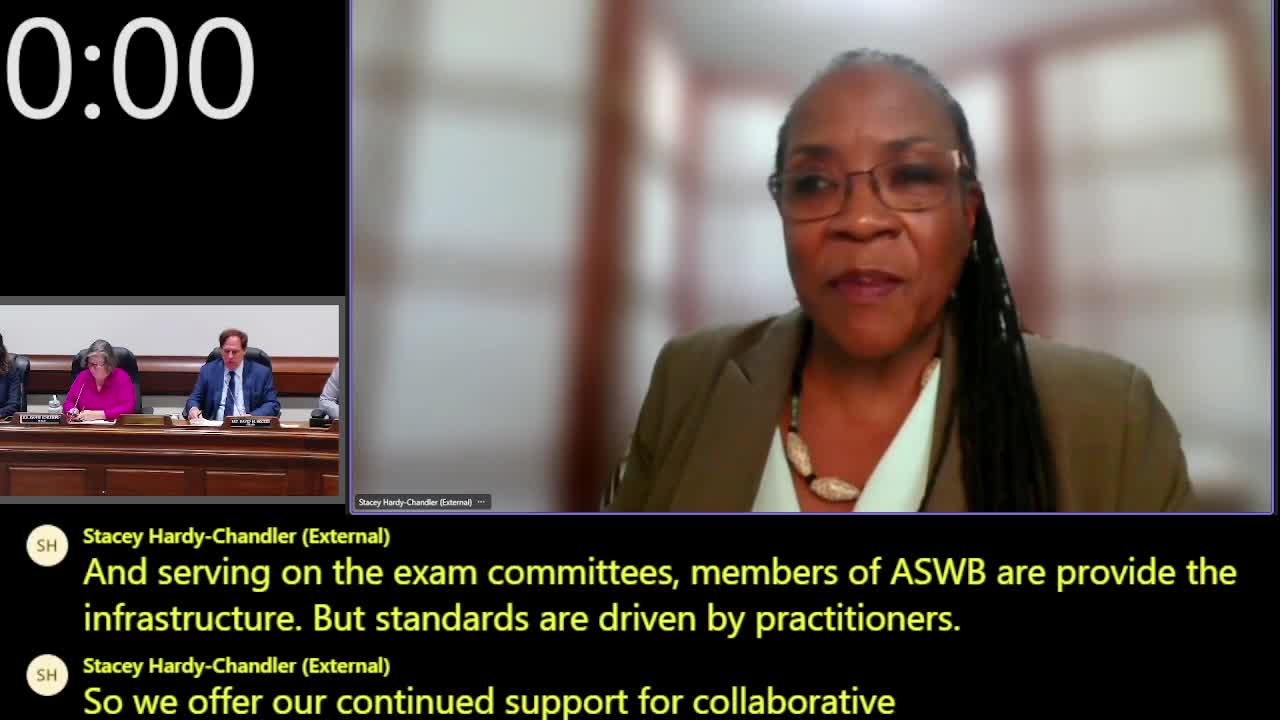ASWB Advocates For Social Work Licensure Compact In Massachusetts Legislation Hearing
July 18, 2025 | 2025 Legislature MA, Massachusetts
This article was created by AI summarizing key points discussed. AI makes mistakes, so for full details and context, please refer to the video of the full meeting. Please report any errors so we can fix them. Report an error »

The Joint Committee on Higher Education convened on July 18, 2025, to discuss significant developments in social work licensure in Massachusetts. The meeting featured testimony from Jennifer Henkel, project director for the licensure portability grant at the Association of Social Work Boards, who emphasized the importance of the social work licensure compact. This compact aims to streamline the licensure process for social workers, allowing them to practice across state lines with a multi-state license.
Henkel highlighted the removal of the master's exam as a requirement for entry into practice for licensed certified social workers, noting that this change could hinder the compact's effectiveness. She explained that a qualifying national exam is essential to ensure consistency and credibility in social work licensure across states. Without such an exam, states may hesitate to join the compact, fearing a lack of uniformity in professional qualifications.
As of now, 29 states have enacted legislation to adopt the social work licensure compact, including all New England states except Massachusetts, which has pending legislation. Henkel urged the committee to support the compact, stating that it would enhance access to social work services in the state, addressing workforce shortages and increasing demand for care.
The discussion also touched on the experiences of Rhode Island and Connecticut, which have removed the master's exam while still participating in the compact. Committee members expressed concerns about public perception and the potential confusion regarding the qualifications of social workers who opt for different licensure tracks.
Mickey McGrath, a master of social work student at Salem State University, also spoke in favor of the compact, particularly its provisions for funding internships for MSW students across the Commonwealth. McGrath's testimony underscored the importance of practical experience in social work education.
The committee's discussions reflect a critical moment for social work licensure in Massachusetts, with potential implications for the availability and quality of social work services in the state. The outcome of the proposed legislation could significantly impact both current and future social workers, as well as the communities they serve.
Henkel highlighted the removal of the master's exam as a requirement for entry into practice for licensed certified social workers, noting that this change could hinder the compact's effectiveness. She explained that a qualifying national exam is essential to ensure consistency and credibility in social work licensure across states. Without such an exam, states may hesitate to join the compact, fearing a lack of uniformity in professional qualifications.
As of now, 29 states have enacted legislation to adopt the social work licensure compact, including all New England states except Massachusetts, which has pending legislation. Henkel urged the committee to support the compact, stating that it would enhance access to social work services in the state, addressing workforce shortages and increasing demand for care.
The discussion also touched on the experiences of Rhode Island and Connecticut, which have removed the master's exam while still participating in the compact. Committee members expressed concerns about public perception and the potential confusion regarding the qualifications of social workers who opt for different licensure tracks.
Mickey McGrath, a master of social work student at Salem State University, also spoke in favor of the compact, particularly its provisions for funding internships for MSW students across the Commonwealth. McGrath's testimony underscored the importance of practical experience in social work education.
The committee's discussions reflect a critical moment for social work licensure in Massachusetts, with potential implications for the availability and quality of social work services in the state. The outcome of the proposed legislation could significantly impact both current and future social workers, as well as the communities they serve.
View full meeting
This article is based on a recent meeting—watch the full video and explore the complete transcript for deeper insights into the discussion.
View full meeting
